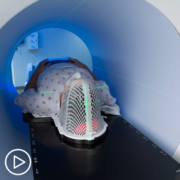Head and neck cancer research is evolving rapidly, leading to expanded treatment options for patients. Expert and researcher Dr. Ezra Cohen discusses key factors that impact head and neck cancer treatment decisions, reviews emerging research, and provides tips for collaborating with your healthcare team.
Dr. Ezra Cohen is a medical oncologist, head and neck cancer researcher and Chief Medical Officer of Oncology at Tempus Labs.
Download Resource Guide
See More from Evolve Head & Neck Cancer
Related Resources:
Transcript:
Katherine:
Hello, and welcome. I’m your host, Katherine Banwell. As patients collaborate on treatment decisions with their healthcare team, it’s important that they understand all of their options and how these options may be impacted by research developments. And that’s why the Patient Empowerment Network, or PEN, created the Evolve series. To arm you with the latest information and help you feel empowered and confident during conversations about your care. In today’s program, we’re going to hear from an expert in the field about the evolving treatment landscape and discuss how you can play an active role in your care.
Before we meet our guest, let’s review a few important details. The reminder email you received about this program contains a link to program materials. If you haven’t already, click that link to access a guide to help you follow along during the webinar. At the end of this program, you’ll receive a link to a program survey.
Please take a moment to provide feedback about your experience today in order to help us plan future webinars. And finally, before we get into the discussion, please remember that this program is not a substitute for seeking medical advice. Please refer to your healthcare team about what may be best for you.
Well, let’s meet our guest today, Dr. Ezra Cohen. Dr. Cohen, welcome. Would you please introduce yourself?
Dr. Cohen:
Thanks very much. Thanks for the invitation. So, I am Ezra Cohen. I am a medical oncologist and have been involved in head and neck cancer research for about 20 years in the laboratory and in the clinic. And it’s been my main focus of research for that time period.
Thanks for having me.
Katherine:
Well, thank you so much for taking time out of your schedule to join us today. As you know, head and neck cancer research has been progressing quickly. What recent developments do you think patients should know about?
Dr. Cohen:
Well, there are a lot, really. And I think probably the first and foremost is the impact that immunotherapy is having on treatment for head and neck cancer. And that is mostly in the form of a drug called pembrolizumab (Keytruda). It’s an anti-PD1 antibody that really – what it does is stimulate a specific cell type in the immune system called T cells. And now, it’s approved for the treatment of patients with recurrent or metastatic disease. However, for patients, I think probably the most important development over the last little while is the realization of the important of the multidisciplinary team in the management of patients with head and neck cancer.
It used to be that the care was driven by a single oncologist or a single individual, but over the last, I would say mostly over the last decade, maybe a little but more than that. There’s becoming this realization more and more and the implementation, of course, of these multidisciplinary approaches involving a surgeon, a radiation oncologist, a medical oncologist, but much more than that. A speech and language pathologist, a swallowing expert, nutritionist, psychologist, pharmacists, dentists, of course oral surgeons.
With the, now, the prospective data to validate that in a multidisciplinary setting, with a multidisciplinary tumor board where each patient is discussed with all of these individuals providing input. The outcomes are substantially better. And so, for patients, I think that that’s had the greatest impact, because we’re talking about patients who can be cured for the most part.
And those cure rates increasing just simply by getting the right people involved in their care.
Katherine:
Yeah. Very important, then. As I mentioned a few minutes ago, patients should be aware of all of their options. How can patients stay informed as the treatment landscape expands and changes?
Dr. Cohen:
Yeah. It’s challenging because not only are patients and their caregivers grappling with this diagnosis, and it’s a brand-new world for almost all of them. Many patients have never had to deal with cancer ever before. Pile onto that the functional and social aspects of having head and neck cancer. Remember this is a cancer that affects so much of what makes us human – our ability to communicate, to speak, to eat, to swallow. And so, now, patients are flung into this situation, and it is challenging to find good information.
Having said that, often the oncologists that are involved in the person’s care should be a great source of information, especially if those oncologists have experience treating head and neck cancer. And incidentally, just as an aside, there is also data and mounting data that the more experienced a center is in treating head and neck cancer, the better the outcomes. And so, that’s something that patients may want to think about as they choose their providers.
But then there are also public sources. There are support groups for head and neck cancer. The Head and Neck Cancer Alliance is one of those. SPOHNC is another and they’re excellent sources of information for patients. American Cancer Society is always a very good source of information, mostly for cancer basics but they do have the pages that are dedicated to head and neck cancer.
And then the American Society of Clinical Oncology, or ASCO, actually does have a patient-facing part of their organization, and that can help not only with information about the disease, but it can also help find providers that have a specific interest in this type of cancer.
Katherine:
Those are all great resources. Thank you. A key part of research moving forward is the clinical trial process. Can you talk about the benefits of patient participation?
Dr. Cohen:
Of course. And I’m certainly a firm believer. It’s been part of what I’ve been doing for, again, over 20 years. And, so, certainly I think clinical trials are a critical component of our ability to produce better outcomes and move forward. The sobering reality is that only 3 percent of adult patients actually participate in clinical trials.
Katherine:
Wow.
Dr. Cohen:
And if we’re really going to move the field forward and be where we want to be with cancer, and that is to either cure as many people as we can or turn cancer into a chronic disease, better yet in many individuals, detect it early and prevent it. We need much greater participation in clinical trials. So, that being said, nothing is going to happen, we are not going to make strides forward in therapeutics and diagnostics, whatever in prevention, without clinical trials. Even the basic standards of care that we engage in now, and I mentioned that drug pembrolizumab, that was approved on the basis of a large randomized clinical trial.
Now, having said that, I think patients – part of the responsibility is on patients to ask their provider, “Well, what about clinical trials?” There is almost always a clinical trial that is available given a specific setting. The challenge is that it may not be available where the patient is seeking care. And there is a large disconnect in that regard.
Now, there are different organizations that are trying to improve that, improve the diversity of participation in clinical trials and the equality of availability of clinical trials to the entire population, not just people going to large academic medical centers. But, that’s the first thing I would tell patients, is part of the list of questions that you have for your provider, especially at the beginning and throughout the entire process, is there a clinical trial that would be applicable to my situation?
And if the answer is, “Well, no.” The follow-up should be, “Well, what about in the area?” Or, “What about something that may not necessarily be available in this practice but what about somewhere else in town or somewhere I could access?” Of course, that may not be possible for all patients. But if it is, I would encourage all people to ask that question. And then there is a large responsibility, I think, on providers to make clinical trials available if we’re going to improve that number from 3 percent.
There are a lot of exciting agents being studied now in head and neck cancer – immunotherapy drugs, antibody drug conjugates, novel mechanisms, cell therapies, vaccines. So, there’s certainly no paucity of interest in developing drugs in head and neck cancer and technologies as well. So, there are clinical trials available, and I think we, as a community, need to make a – need to do better in enrolling patients on those studies.
Katherine:
Yeah. Before we talk about the currently available treatment options, I think for many people there’s confusion about what neck and head cancer is. How would you describe this group of cancers?
Dr. Cohen:
Yeah. And we do make it confusing, a little bit. So, the confusion is well-founded. When I talk about head and neck cancer, and I think when most of us talk about head and neck cancer, we’re really thinking about three major cancer types. The first is mucosal squamous cell carcinoma. I’ll get into that in just a second. The second is thyroid cancer, and the third are salivary gland cancers. Those are the cancers that I primarily see in my head/neck cancer clinic. We don’t see brain cancer. A lot of people think, “Well, head and neck cancer should include brain cancer.” Brain cancer really is a completely different entity, different biology, different set of physicians, different set of treatments.
And so, the way I explain it simply is everything above the clavicles but not the brain. Having said that, the majority of patients that we see in our clinic, do have squamous cell carcinoma. And those cancers start in the lining of the mouth and the throat. So, tongue cancer, throat cancer, larynx cancer, those all fall under head and neck cancer, and those are the most common malignancies that we see.
Katherine:
How are innovations in technologies accelerating head and neck cancer research?
Dr. Cohen:
I think, in many ways. First there’s – we mentioned the multidisciplinary approach of head and neck cancer. and each of the disciplines, the major therapeutic disciplines, being medical oncology, radiation and surgery, really have had dramatic technological advances in the last, certainly in the last decade, maybe a little bit longer.
For the surgery, it’s been the ability to do minimally invasive surgery, usually through a robot called transoral resection. And this is, as the name implies, literally a robot that’s controlled at the side of the operating room or even sometimes controlled remotely. But the advantage is that the instrument is much smaller than the human hand, and it can articulate in every degree possible. Which, obviously, the human hand has restrictions.
So, in other words, that robot can get into places and get into areas that would be very difficult without a much bigger surgery if done without the robot. And now, that surgery called TORS, transoral robotic surgery, has become pretty well, pretty standard for cancers of the base of the tongue and the oral pharynx.
That is really the back of the throat. Whereas in the past, in order to access those areas, the patient’s jaw would have to have been split, and the area had been opened. Now, that’s not necessary at all, and the surgery has turned into a much, much faster recovery with equivalent oncologic outcomes. And, of course, there’s more advancements going on in that regard.
For radiation, I think the most relevant technological advances have been the ability to focus radiation through different means on the tumor and spare normal tissue. Whether that’s with something called IMRT, which is essentially a much more sophisticated way to deliver radiation that is controlled by a computer that allows the radiation fields to be contoured around structures in a 3D fashion, much more than we were able to do prior to that.
And, of course, the other way is to use a different type of energy. Whereas conventional radiation, when we talk about radiation, we’re talking about photons. Protons, now, are becoming more widely available. And that particle has a different way to deliver energy and can actually spare normal tissue but still deliver the energy desired to the tumor. So, tremendous advances in radiation.
And then, of course, for medical oncologists, we’ve had advancements in both diagnostics and in therapeutics. 10 years ago, sequencing a cancer, deciphering the genes that drive it, the mutations that drive it, was uncommon. And, in fact, even I dare say, frowned upon by the community.
But now, there isn’t a patient that I see who has recurrent or metastatic disease that I don’t sequence. I sequence them all.
Katherine:
Wow.
Dr. Cohen:
Because the technology is readily available and quite honestly, it gives us more information that we might be able to apply to the treatment of that patient. So, that’s been a very large, a very big advancement. And then, of course, therapeutically we’ve had different agents that we’ve been able to look at. I mentioned immunotherapy. There are many new drugs that are being tested and hopefully very soon even approved for patients with head and neck cancer.
Katherine:
That’s great. I want to mention to our viewers that if you want more basic information, PEN has created a head and neck caner toolkit, which includes information about diagnosis and staging. And you can find it at powerfulpatients.org. So, Dr. Cohen, I’d like to move onto treatment approaches, and you’ve already mentioned some of them.
What is the typical route for a head and neck cancer patient? Does it start with surgery?
Dr. Cohen:
Well, it really depends. And what I said is that head and neck cancer, for the most part, is a locally advanced disease. And I say that because it has certain implications about the way we think about treating patients. And what I mean by that is that the great majority of patients with head and neck cancer will initially present with either a localized tumor or a tumor with involved lymph nodes.
In other words, and that’s 90 percent, 90 percent of patients will present that way. In other words, it’s actually uncommon for patients with head and neck cancer to present with metastatic disease. That’s different than many other cancers. Lung cancer, pancreatic cancer, breast cancer, many times in those situations, patients when they come to the attention of a physician, unfortunately, already have metastatic disease. That’s not the case with head and neck.
And so, what does that mean to have a disease that’s locally advanced? Well, the most important thing, the first thing, is that most patients, we are going to be treating with curative intent. That is, we’re going to try to cure the disease. The second thing is that the disease, and its treatment, are going to have functional outcomes, potentially for that patient.
And that gets back to something I was saying before in terms of think about how much of how we define being human happens above the clavicles. It’s really what makes us human. And so that has dramatic implications obviously for the patient. So, for head and neck cancer, the fact that it’s a locally advanced disease means that we’re going to think about curing the majority of patients, at least try to. But, we’re also going to think very strongly about how can we preserve those critical organs of swallowing and speaking and socializing?
It also is a disease that tends to recur or come back in a locally advanced fashion. And that’s the other part of why I call it a locally advanced disease. So, unfortunately, oftentimes when head and neck cancer recurs, and obviously we try to avoid that, it comes back in the same area. And, of course that has the same implications for what we try to do with treating patients.
Katherine:
So, even using radiation and chemotherapy, other immunotherapies, the cancer will still come back?
Dr. Cohen:
Yeah. Yeah. And I realized I didn’t really answer your question in terms of the approach to the patient. I just gave you some general guidelines. So, let me step back and talk a little bit about that. And then we can talk about the integration of different modalities.
Katherine:
Sure.
Dr. Cohen:
The approach really, it depends on a few things. The primary is really where the tumor is, where the primary tumor is.
nd the reason behind that is what I as saying about the functional outcome. For instance, if somebody has a small tumor of their tongue, of the front of their tongue let’s say, a surgeon can easily remove that and the patient can continue to speak and swallow normally. And so, in cases like that, obviously we would do surgery first and then, if the patient needed it for whatever reason, we might follow up with radiation or chemotherapy.
The converse is true for a tumor that may be farther back in the throat. So, let’s say an area called the oropharynx that involves the throat that you can see, the part of the throat that you can see when you open your mouth widely. Well, if we take out a tumor there, that will have much more significant implications for long-term function. The patient may not be able to swallow or speak normally again.
And so, for those types of tumors, we would take a non-surgical approach. Not that surgery couldn’t be done, it could. But, sometimes it’s better not to do surgery up front to preserve function. So, again, it’s those two goals that we have to keep in mind. We want to cure the cancer, but we want to preserve function.
Katherine:
Right.
Dr. Cohen:
Then you mentioned about chemotherapy, radiation, immunotherapy. And in a non-surgical approach, that’s what we would do first. We would do either radiation therapy alone, or radiation and chemotherapy. And that primarily depends on how extensive the cancer is. The more advanced it is, the more likely we are to add chemotherapy. Because we know from clinical trials, getting back to the importance of clinical trials, we know that adding chemotherapy in advanced cancers does improve survival. And so, that’s predicated on really where the cancer is and how large it is.
Katherine:
What about treating more advanced disease? Are the choices different?
Dr. Cohen:
Sure. Well, let’s define what we mean by more advanced. If the cancer is still localized, so even if it’s advanced, let’s say it’s a large tumor that’s invading other structures. Let’s say there’s a lot of lymph nodes involved. We would still take – assuming the patient, ultimately, it’s always the patient’s decision. We would recommend to the patient often that we try to take a curative approach. And that curative approach in quite locally advanced cancers would almost involve everybody, so, chemotherapy, radiation ,and surgery. Almost always involve those things to try to eradicate the cancer. If we’re talking about an advanced cancer in the sense that the cancer had come back, so it’s recurrent or it had metastasized, then we really are talking about mostly systemic therapy or some sort of drug therapy.
And now, that almost for all patients, includes immunotherapy. Again, based on the results of clinical trials. That’s relatively new. That’s been approved now for about five years, maybe six. But it has led to dramatic improvements in outcome for these patients. Now, when we look at the long-term data from these clinical trials, we’re beginning to see that about one in five patients with recurrent or metastatic disease are still alive five, six, even seven years later. That’s something that we did not see in the past. And so, immunotherapy has been a tremendous advance forward. Now, of course, the other side of that is four out of five patients are still dying so we clearly need to do better. But the fact that one out of five is surviving is amazing.
Katherine:
Yeah. Yeah. Okay. It’s a lot. It’s a lot to take in and consider. And I can’t imagine how difficult it is for the patients and the caregivers. So, now that we understand what the approaches are, how is a path decided then or determined for an individual patient? Is there key lab testing that can impact prognosis and treatment options?
Dr. Cohen:
Once a patient comes to the attention of the team, and that will usually be accompanied by some sort of biopsy, some sort of pathological diagnosis to confirm that indeed, we’re dealing with let’s say, squamous cell carcinoma. Then the next thing we want to do is we want to stage the disease. And what that means is basically we want to know as much as possible, or accurately as possible, where the cancer is and how big it is.
So, that would almost always involve scans, usually CT scans, sometimes a PET scan. And we can talk about the advantages and disadvantages of each. Sometimes an MRI in certain situations. But suffice it to say some sort of scan. Some sort of imaging that can tell us where the cancer is, how big it is, if there are any lymph nodes involved and if that cancer has spread beyond the head and neck area. Once we stage the disease, most patients, and I think certainly most patients should be discussed, their pace, that is, should be discussed at a multidisciplinary tumor board. Where, again, all the specialists convene at the same time, and really go over all the data that are available on that individual and come up with a treatment recommendation.
That treatment recommendation can be a single modality. So, some small tumors can just be addressed by surgery alone, or radiation therapy alone. But, for more advanced tumors, it is often all three modalities: surgery, radiation, and chemotherapy. And the way they’re sequenced, the way they’re implemented, should be individualized for that specific patient. Again, with those two goals in mind: to cure the cancer and to preserve function.
Katherine:
What else could guide a treatment decision? For instance, a patient’s co-morbidity, their age, things like that?
Dr. Cohen:
All of those things.
Katherine:
Yeah.
Dr. Cohen:
So, beyond – and those are things of course that we would consider in the discussion, not only at the tumor board but of course with the patient. We know that the therapy that we often recommend is quite aggressive and toxic.
Now, the justification for that is that we’re going to try to cure the cancer. And, so we think, and of course we discuss this with the patient, that putting the patient through this course of treatment is worthwhile, makes sense, because at the end of it, the goal is for the cancer to be gone. Now, not all patients will agree with that and of course, we, based on comorbidities and age and something we call performance status, we also want to make sure that the patient can get through this aggressive treatment. Let me just go on a bit of a tangent and describe the therapy for a patient with local advanced head and neck cancer. It would involve about six to seven weeks of radiation, given Monday to Friday. Usually either weekly, or every three-week chemotherapy depending on the chemotherapy chosen.
And possibly even surgery either before or after the combined chemotherapy and radiation. And so, we’re talking about at least a three-month course of treatment going from the start to recovery. Another three months of side effects that are less intense but still there. And it’s a lot for patients to go through. Patients and their caregivers. And so, if we feel that there’s a serious comorbidity that would not allow the patient to do that, we sometimes have to alter treatment so that obviously, we don’t want to harm the patient with our treatment. Certainly we don’t want to put them in a life-threatening situation. So, we do have to take those things into account. The good thing about all this – or I guess the silver lining, if you will, is that these toxicities get better.
Patients recover. So, what I tell patients is we’re going to put you through hell, but at the end of it, I want to be sitting across from you and saying the cancer is gone, and you’re swallowing, and you’re talking normally.
Katherine:
Right. Right. So, there’s light at the end of the tunnel.
Dr. Cohen:
Exactly.
Katherine:
Yeah. So, that leads me to my next question. Why is it so important, then, for patients to engage in their care and their treatment decisions?
Dr. Cohen:
I think it’s critical not only for patients but for their caregivers as well. And really, patients should arm themselves with information. And fortunately, we live in an age where information is more readily available. You don’t have to depend on a single source. Now, granted, that information can be confusing, and sometimes it’s way too confusing. Sometimes that information can even be misleading. So, one does have to be careful.
But, having said that, I think it’s so important for patients to arm themselves with information, different approaches, and what I often tell patients is get a second opinion. With one caveat, that I’ll get to in a second. Because the reason is this is a life-threatening diagnosis for, unfortunately, many patients. And the first approach, our first chance to treat it is our best chance to treat it. So, you really want to make sure that you’re in a center that you’re comfortable with, preferably one that has experience. A provider that you’re comfortable with, that you feel at ease asking questions, you’re not intimidated and a plan that really makes sense for you and has taken into account what is this individual.
What’s our best approach to this individual? Not to an entire population but what are we going to do for this person sitting in that chair at this time? Now, the caveat for second opinions, especially for patients with locally advanced disease, there is a time factor. And what I mean by that is I have seen patients get multiple opinions and delay the start of therapy, which we now realize impacts our ability to cure the cancer. And so, I would say it’s fine to get second opinions or even third opinions, but don’t take a lot of time doing it. The earlier therapy starts, the better our chance of curing the caner. So, there is sort of a balance there.
Katherine:
Well, that’s great advice, Dr. Cohen. PEN has also created downloadable office visit planners to help you organize your thoughts and communicate effectively with your healthcare team.
And that’s also in the toolkit I mentioned earlier at powerfulpatients.org. And I think this is a good segue into talking about the importance of self-advocacy. If a patient is feeling that they aren’t getting the best care or they’re uncomfortable with the care they’re getting, what steps should they take to change that?
Dr. Cohen:
Well, I think the first thing is talk to the provider. Just have that conversation. I think we have to realize that oncologists are human, and they’re people, and sometimes they get very busy. Sometimes they don’t pay attention to as much as they should. And sometimes, they don’t even know that there’s a problem. So, I would say the first thing to do is have a frank conversation with your provider. These are my questions. Don’t be afraid to ask questions. Never be afraid to ask questions. These are my expectations.
Can you meet them? And in my experience, not even just personal experience, but working with many oncologists over two decades, most oncologists will say, “Oh, I didn’t realize that this was what you wanted. Let’s make it happen.” So, that I would say is the first thing. Talk to the people that are already taking care of you.
If, or whatever reason, that doesn’t work and you’re not comfortable, I would ask that provider, “Is there somebody else that – I would like to change. Is there somebody else that you would recommend?” In the worst-case scenario, that might involve going to a different institution. And the reason I say that’s a worst-case scenario is that especially in the setting of locally advanced disease, interrupting therapy or changing therapy in the middle really would have a dramatic adverse impact on outcome.
So, I would try to avoid that as much as possible. If there are natural points in the care where it makes sense to consider a change, I think that would be a lot less impactful and make more sense. For instance, if somebody is going from having completed a course of chemotherapy radiation, they now have no evidence of disease on their scans, and they want to switch to a center that is closer to home, for instance. That makes sense. And we have certainly many patients that do that and that’s a natural transition. But, to change in the middle of care, that can often have a dramatic negative impact.
Katherine:
Well, Dr. Cohen, thank you for sharing all this information. I’d like to close with your thoughts on the future of head and neck cancer care. Where are we headed and – excuse me – where are we headed, and what would you like to leave our audience with?
Dr. Cohen:
Well, I think there are a few things I’ll emphasize, and I’ll talk a little but about the future. The first is this is, for many patients, a curable disease, and patients should think about what they need to set themselves up for the best outcome, both in terms of getting rid of the cancer and in terms of function. And I think those are seeking care at experienced centers with multidisciplinary teams and multidisciplinary tumor boards. That’s one.
Two would be that there are a lot of things that are happening and hopefully going to change the way we approach head and neck cancer in the near term. There are already drugs being tested for patients with locally advanced disease that we think are going to improve outcomes dramatically.
And there’s so much happening for patients with recurrent or metastatic disease with different agents and different technologies. That I really think in five years, we’ll be curing more patients with better outcomes in the locally advanced setting, and we’ll have patients that have recurrent metastatic disease where we would have felt that their survival would be counted in months, where it’s going to be counted in years, maybe even some of those patients being cured. So, the future, I think for cancer in general, but certainly for head and neck cancer, is incredibly optimistic.
Katherine:
Yeah. It’s such promising news, Dr. Cohen. And I want to thank you so much for joining us today. We really appreciate it.
Dr. Cohen:
Yeah. My pleasure. Thanks for the invitation.
Katherine:
And thank you to all of our collaborators A– excuse me – and thank you to all of our collaborators. If you would like to watch this webinar again, there will be a replay available soon.
You’ll receive an email when it is ready. And please don’t forget to take the survey immediately following this webinar. It will help us as we plan future programs. To learn more about head and neck cancer and to access tools to help you become a proactive patient, visit powerfulpatients.org. I’m Katherine Banwell. Thanks for being with us.



















